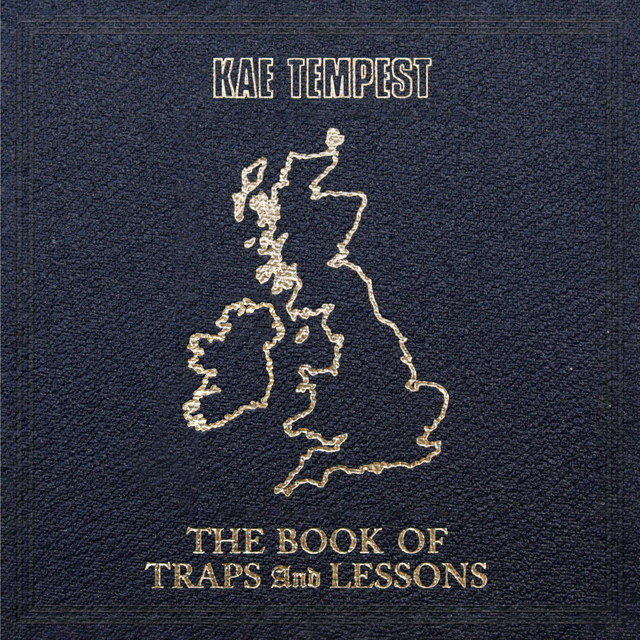Poetry Review
The Line is a Curve: Taking Kae Tempest’s temperature

In my humble opinion Kae Tempest is one of the best poets in the world at the moment and their new album/volume of poetry, The Line is a Curve, released in early April 2022, justifies that honorific.
There are things I must record, must praise
There are things I have to say about the fullness and the blaze
Of this beautiful life, of this beautiful life.
Tempest is a prolific poet and writer. You can almost feel their need to get things onto paper, to experiment, to exhale. In less than a decade they have shown a remarkable genre fluidity, writing novels, adapting and directing “cover versions” of Greek tragedies (Paradise, 2021), several books of poems and philosophical reflections (On Connection, 2020), and now performing on a demanding new UK tour of The Line is a Curve (which has reached number eight in the British charts, unusual and good for poetry, to say the least).

In my humble opinion Kae Tempest is one of the best poets in the world at the moment and their new album/volume of poetry, The Line is a Curve, released in early April 2022, justifies that honorific. (Photo: blood-records.co.uk/Wikipedia)
And yet there is nothing rushed about her output.
The Line is a Curve contains 12 new poems. They can’t be easily summarised, there’s too much going on within them. In some there is Tempestian observation and social commentary, but in others there’s a great deal of internalisation.
What struck me most with this collection though is a feeling that Tempest has crossed a threshold: and it’s into the self they’ve been trying to escape, into their present. Tempest now takes on the world from within the fortress-self, even if still uncertain about the fault lines and fragility of the ramparts.
Tempest knows the world is simultaneously bad and beautiful, but you can’t have one without the other, so they excoriate the former and celebrate the latter.

Kae Tempest performs at Music Hall of Williamsburg on March 24, 2022 in New York City. (Photo by Dia Dipasupil/Getty Images)

Since Kae Tempest’s last collection of poems, The Book of Lessons and Traps (2019), written before the plague years, there’s been some revelation, personal epiphany. Tempest has metamorphosed into her own brand new ancient with a brand new consciousness. (Photo: npr.org/Wikipedia)
Since their last collection of poems, The Book of Traps and Lessons (2019), written before the plague years, there’s been some revelation, personal epiphany. Tempest has metamorphosed into their own brand new ancient with a brand new consciousness.
Clues to their emotional state are littered across the poems and occur in different settings:
Sure, it’s not by our past that our future will be measured
It’s by the very moment that we’re slumping in, dishevelled
Six hours in to some TV show that tastes like the feeling of pizza
From both the written text and the way the poems are spoken there’s a determination to conquer. It feels like a set of “Notes to Self” about how to tame and reorder the external and internal monsters of 21st-century life. They write in Move:
Long as I live, I will flounder
Buckle and doubt
But I’ll go round for round till the rounds run out
When it’s all too late and the rain in the graveyard
Plant my tree looking out over London
So many things that never came good
But I did what I could
Move
I’ll fight you till I win
At times the poems are spat out with the defiance of Sex Pistols lead singer Johnny Rotten, but without needing to be a “foul-mouthed yob”. Poems like Priority Boredom, the first in the new collection, have the punkish sharpness of John Cooper Clarke’s facetious social descriptions of his “fully furnished dustbin” (in Beasley Street); but at other times the poems have the poise and balance of classical poetry.
Like other great poets of this age, Tempest self-consciously acknowledges that theirs is an ancient tradition of wordcraft: they often credit William Blake (another Londoner who railed against the machine) as a source for some of their inspiration, in the same vein as Tupac Shakur said he revered some of Shakespeare’s plays and I once heard Linton Kwesi Johnson talk about embarking on a study of John Keats.
Because it hitches itself to ancient oral traditions of poetry and storytelling, listening to The Line is a Curve offers an experience in itself: but you need to really listen. If you can block out other thoughts and other sounds you will find Tempest’s vocal inflections amazing, turning the inert written word into a battering ram. Then, things come out of the poetry that cannot easily be found on the page.
In this Tempest is aided by a complementary musical accompaniment by their collaborator Dan Carey that’s never obtrusive, independent but in a dance with Tempest’s words and their possible meanings, an interpretation of moods, at times providing syncopation, at times crescendo, at times a lilting lyrical lone guitar.
One of the things that inspires me about Tempest is that much as they lament the crisis of the world we have created, and have “allowed” to be contorted in so many unnatural ways…
“What are your dreams when they become ghosts in your ears
Telling you things you just don’t want to hear? (No Prizes)
… their poems are less about disgust than wonder at the nobility of the human beings who continue to battle through adversity. In this sense, although Tempest’s observations are drawn from London, their characters are the universal downtrodden:
“Now you want to be free
From the strain of what’s done in your name
Every single inch of you is somebody’s claim” (Salt Coast)
As a result, dark poems have a lightness, an optimism and a resilience, the same power that has carried our species through adversity from ancient times.
Words got me the wound and will make me well
On a more personal note, listening to and reading Tempest causes me to reflect on some of my own current anxiety about words, over words and about the powers and glory of words in the time that we are living in.
As a writer I have a nostalgia for the time when words were powerful instruments of progressive change. I think of Karl Marx’s Communist Manifesto, Tom Paine’s Rights of Man, Mary Wollstonecraft’s Vindication, Solschenizyn or Steve Biko’s I Write What I Like. Once upon a time, words had a viral power, independent of the internet; knowing this, people went into exile, prison and died for words.
A few still do.
Ironically, however, the power of writers stemmed in no small part from a greater inequality in access to words than exists today. In the past fewer words were written, there were fewer vehicles for words and therefore those who could wield words most powerfully had the field to themselves.
For example, I recently came across the following startling fact in Amitav Ghosh’s The Nutmeg’s Curse: until 1945, 95% of all written history “was that of five historical nations: Great Britain, France, the United States, the Germanies and the Italies”.
The same must be true of fiction and poetry.
That means that in many ways, “great” poets only made it to greatness because so many other people’s words were suppressed or just not born. (One question writers interested in the totality of human experience might ask is how we resuscitate the words of bygone ages and the perspectives they contained?)
By contrast, in the 2020s sometimes it feels like there are “words, words everywhere and not a drop to drink” (to abuse Coleridge’s The Rime of the Ancient Mariner a little). The literary enfranchisement of so many millions more people, that has been enabled by social media, is a radical and good thing. But it also has dangers associated with it.
Today we must be much more discerning in deciding which words – and the meanings they create – matter most?
Aren’t we drowning words and possibly their meaning?
And there’s another question that Kae Tempest causes me to ask.
What will words do and mean in the great civilisational rupture that is coming?
There are times when I still draw on words first written 10 centuries ago. But will anyone be reading our words, have access to our manuscripts 10 centuries from now, or even one century from now?
So what do words do today? What do poets do today? Or do we just be?
But maybe I’m asking the wrong questions of poetry. At the end of the day poetic words don’t stick around and dwell on themselves; they create a feeling (or don’t) and leave you to do the work on their meaning.
Which brings me back to Kae Tempest.

Kae Tempest performs at Music Hall of Williamsburg on March 24, 2022 in New York City. (Photo by Dia Dipasupil/Getty Images)
Tempest uses words to help us see beauty and dignity in ordinary human nature. They use words to invoke the inner dignity of surplus humans, not by pitying them or parroting them, and certainly not by appropriating them for a political agenda.
Just by letting them be.
Which is why Tempest’s curve reflects something that I feel is going on in many of us and in many parts of the world. People of conscience and connection are shedding unnecessary skins, falling back into and upon ourselves, embracing an acceptance of our brokenness and our dependence on other humans, rather than broken systems that won’t protect us any longer.
This is not defeat but the realisation that it will be by rallying our inner selves that we are most likely to be able to face the coming storms of war, climate crisis and social breakdown. Love of people, love of life, love between people will be an important part of this.
Fittingly, therefore the album’s last poem, Grace, is about the power of love.
What’s my problem?
I’m always drawn back to that wrestling match
Ten thoughts in the ring of my mind playing catch
I can’t live for the noise in my head
I just want to dig a big ditch in the soil of my breath and bury my brain there
But love said
«If you bring forth what is within you
What you bring forth will save you
But if you do not bring forth what is within you
What you do not bring forth will destroy you»
DM/ML/MC
Read other essays on poetry by Mark Heywood:
Tempest and Shafak On Connection and Numbness; and The lesson according to Desmond Tutu and Kae Tempest: The Power of People’s Faces; On reading poetry and quarrelling with myself
















 Become an Insider
Become an Insider
Comments - Please login in order to comment.